Tanimura Shinji, a national treasure in the Japanese music industry, passed away due to illness! He sang at the opening ceremony of the Shanghai World Expo
日期:11-08-2023Tanimura Shinji, a national treasure in the Japanese music industry, passed away due to illness! He sang at the opening ceremony of the Shanghai World Expo
According to CCTV News citing the Japan Broadcasting Association (NHK) report on October 16, local time, relevant people disclosed on social media that the famous Japanese musician Tanimura Shinji passed away on October 8 at the age of 74.
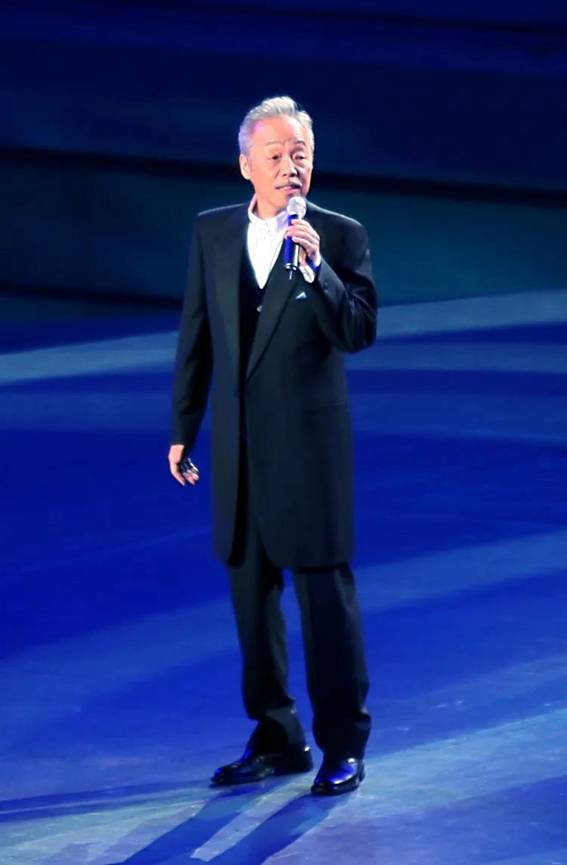
In 2010, Tanimura Shinji sang the song "Star" at the opening ceremony of the Expo 2010 Shanghai.
In order to promote friendly exchanges between China and Japan, Tanimura Shinji had led, participated in and planned many Sino-Japanese singing events and concerts. Since his first appearance on the Chinese stage in 1981, he had forged an indissoluble bond with China.
At the 2010 Shanghai World Expo, Tanimura Shinji served as Japan's promotion ambassador for the World Expo. He sang his famous song "Star" at the opening ceremony, which moved the audience at the scene and around the world.
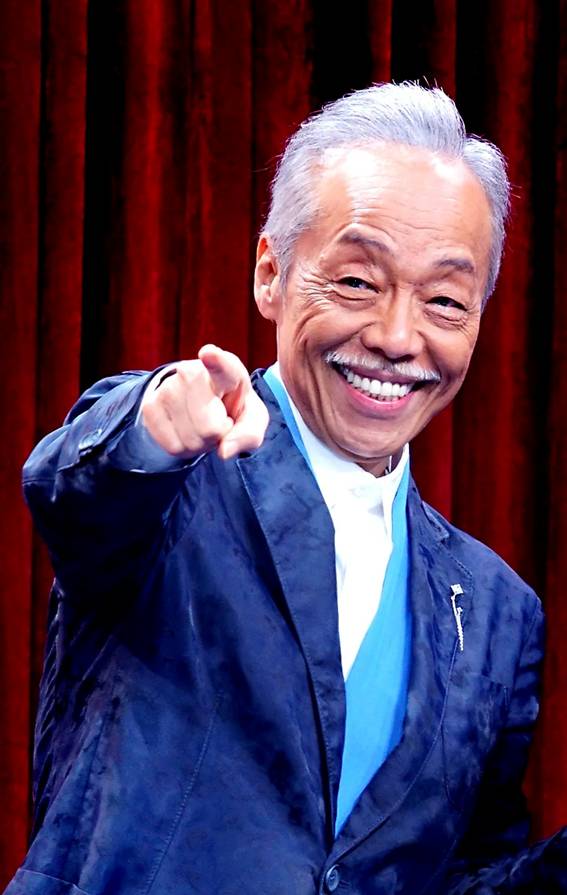
In 2017, Tanimura Shinji attended an event in Shanghai.
Tanimura Shinji is known as a national treasure in the Japanese music scene. His songs are also loved by the Chinese people. The most famous ones include "Star","Flower","Romantic Railway", etc. Nearly 50 songs have been adapted into Chinese songs. It has been sung by Teresa Teng, Leslie Cheung, Jacky Cheung and other Chinese music superstars.
Leslie Cheung's "Who Resonates", the original song is "嚚きは"(Like a Dream) by Tanimura Shinji; my brother's "Together", the original song is "Flower".
"Star" by Teresa Teng and "My Heart Has No Return" by Jiang Yuheng, the original songs are "Pleiades".
"Walking My Way Alone" by Anita Mui and Momoe Yamaguchi, the original song is "This Is My Trial" by Tanimura Shinji.
Jacky Cheung's "Distant Her", the original song is Tanimura's "Romantic Railway".
"Dream of You Coming Back" by Aaron Kwok, the original song is "Last No I Love You" by Tanimura Shinji.
"Journey" by Chen Baiqiang, the original song is "Showa" by Tanimura Shinji.
Priscilla Chan's "Forgetting Sorrow", the original song is "Autumn Zhifu (そねぞねの秋)" by Tanimura Shinji.
Later, Japanese director Ryo Takeuchi also issued a message to express his condolences: Mr. Tanimura is a senior who has always promoted Sino-Japanese exchanges through music. I admire him very much, but it's a pity that I didn't have the chance to interview him.
Farewell, Mr. Tanimura.
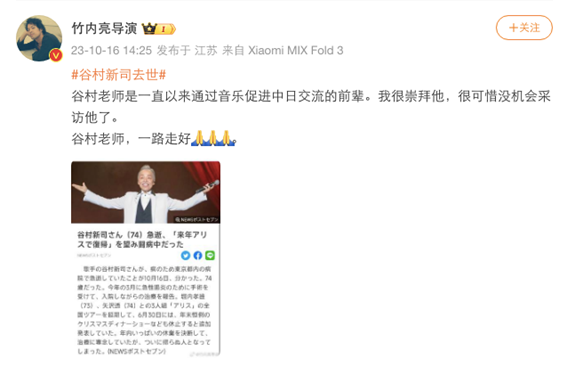
After the news of Shinji Tanimura’s death came out,
Netizens left messages expressing their regrets

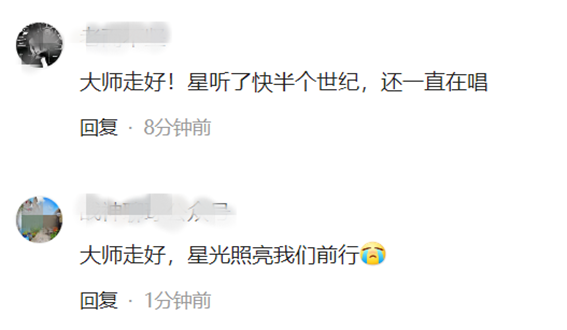
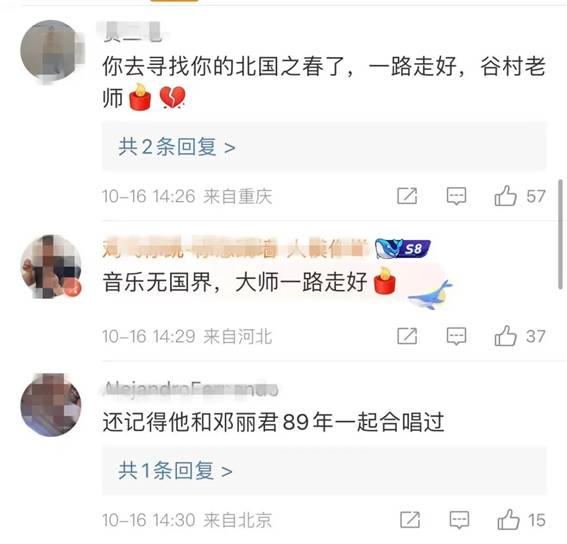
In 2018, when he was 69 years old, Shinji Tanimura sang "Star" again in Shanghai.
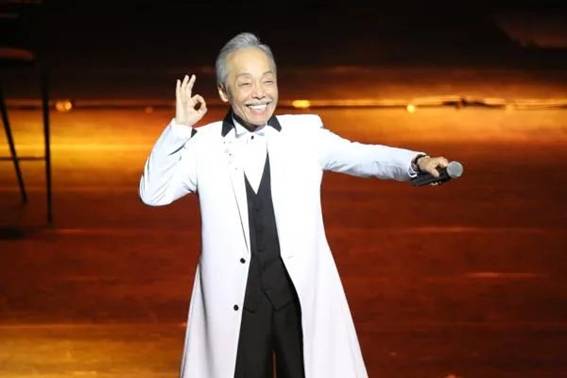
Tanimura Shinji’s concert
This song that he has sung countless times is not only a must-sing at every overseas concert, but he also recorded a new version in his new album "The Star of 38 Years"."The arrangement is exactly the same as before, but the sound is obviously older. A song is like a bottle of wine. When it is first brewed, the fragrance is strong, but it will slowly become mellow as time goes by."
You can say that he is conservative, or you can understand it as the love and protection of precious things by a precocious person. He cherishes this song,"'Star' is the key to opening the door to all Asia and can connect everyone together."
The album of the same name containing "Star" was released in April 1980. This is a lonely song. On the cover, Tanimura Shinji was walking at night with his head down under the dim blue street lights, and the city was silent with him like a wilderness. The album was very successful, especially "Star", which was adapted into versions in different languages and circulated in Asia."Star" by Guan Zhengjie (lyrics by Zheng Guojiang) and Teresa Teng's Japanese and Cantonese versions were particularly famous in the Chinese-speaking area. In mainland China, the Japanese version of "Star" included in Shen Xiaocen's second album was like cutting a hole in the rock wall. Fans began to try their best to collect Japanese songs, which aroused curiosity about the outside world.
In this sense,"Star" was indeed the common memory of Asian people. Its loneliness and brilliance can hit people's hearts without words. The melody composed by Tanimura Shinji combines the melancholy of traditional Japanese ballads with the sparse, opened and distant artistic conception of Tang poetry, which was even more resonant in culturally similar places.
On the stage, this thin and happy old man had a glimpse of the mystery of fate very early. When imagining the scene of the vast yellow grassland, distant mountains and cool breeze, Tanimura Shinji had no idea where this was. It wasn't until I finished writing the song that I remembered that "such a scene must be in China." When he wrote this song (1980), Tanimura Shinji was only 32 years old.
The cold wind blowing into his chest is intertwined with passionate dreams; the stars of destiny scattered in all directions are not only the object of his farewell, but also the eternal existence that will usher in more successors.
He called the song "the happy song."
Tanimura Shinji first set foot on the Chinese stage on August 23, 1981. At the Beijing Workers' Stadium, and participated in the "Hand in Hand Beijing" concert with Chinese singers. This trip also made him set his sights on the entire Asian region.
The first time he came to Shanghai was the "Asia Tour Concert" at the Sports Center in 1994, where he represented Japan.
He is a naive person, and such a wish sounds too much like an artist's wishful thinking. Even in the 1980s with a strong political atmosphere, there may not be enough soil for it to take root and sprout.
But he never stopped building a bridge of communication between China and Japan.
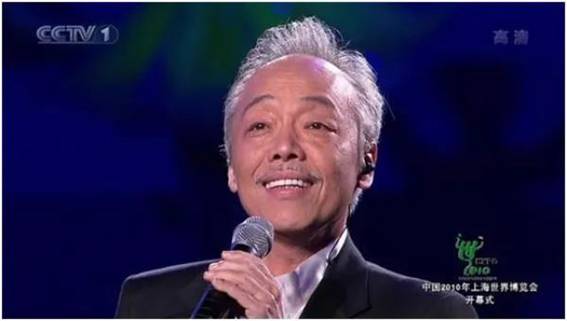
Screenshot of video showing Tanimura Shinji performing at the opening ceremony of the Expo 2010 Shanghai
Teng Junjie, chief director of the opening and closing ceremonies of China's 2010 Shanghai World Expo, hoped to invite Tanimura Shinji to the stage. Unfortunately, during that time Tanimura Shinji had more than 20 performances throughout Japan, and the Expo happened to be stuck in the middle of the tour. Tanimura hoped that Teng Junjie would give him three days to think about it, but he replied one day later:"Yes." For this reason, he made many phone calls to persuade and apologize, and made a lot of compensation before the trip could be made.
What also impressed Teng Junjie was Tanimura Shinji 's dedication as an artist. He had sung "Star" countless times,"For every important invitation from China, he must have walked on stage seriously. And he must have sang directly every time he performed on the stage, absolutely not perfunctory."
In addition to the shining stage, Tanimura was also willing to spend time face-to-face with young Chinese people, and strives to teach music that is difficult to explain in words to Chinese students and promote cultural exchanges between China and Japan.
From 2004 to 2008, when Tanimura Shinji served as a visiting professor at the Shanghai Conservatory of Music, he “spent one week every month in Shanghai.” Tanimura Shinji 's class was very practical. He asked each student to write lyrics and then helps them complete the whole process of composing music, arranging music and performing on stage.“I focus on capturing each student’s personality.”
Source | Morning News, Xinmin Evening News